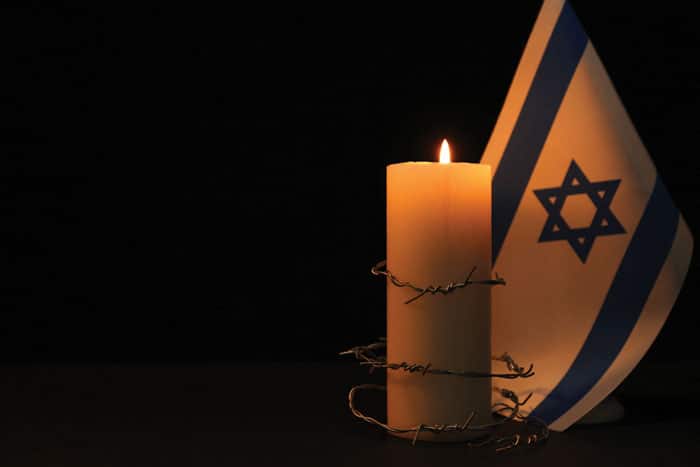
The number six million has a singular resonance for Jews and people around the world. It is the number of Jews who were murdered in the Holocaust, a number that forever lives in a past we dare not forget.
Over the past several decades, billions have been invested to build memorials to this unspeakable tragedy. When we enter these memorials, our attention is naturally drawn to Death. How could it not be? We’re confronted with the dizzying notion of six million lives who were extinguished, each with countless stories and sub-stories that will be told and retold for generations.
The Holocaust is, above all, a story of Death. But in the grand picture of Jewish history, it is also a story of a people who refused to wilt away, a people who in the midst of despair doubled down on Life.
So the Holocaust is, above all, a story of Death. But in the grand picture of Jewish history, it is also a story of a people who refused to wilt away, a people who in the midst of despair doubled down on Life.
That’s why it may be time to ask this question: When commemorating the Jewish tragedy of the Holocaust, should we not also commemorate the Jewish miracle of survival?
The Jewish tradition draws connections between the extremities of life and death. The memories of the dead nourish the lives of the present. The lessons and wisdom we gain from the departed help our lives move forward. Death can strengthen our will to live.
When I think of the six million Jews who perished in the Shoah, I can’t help thinking of six million Jews who are thriving today in Israel, or six million Jews who are thriving in America. I can’t separate the millions who died yesterday from the millions who are thriving today. If anything, I see the thriving as our response to the dying.
I can easily visualize Holocaust memorials adding a wing that commemorates Jewish survival. Before leaving these memorials, visitors must be reminded that at our lowest moment, the Jews chose life above all; that from the ashes of our darkest days we chose to move forward with the redeeming light of life.
The universal lesson of the Holocaust is that evil exists and must be eradicated. That will always be true. But a larger, even deeper lesson is that life has the power to transcend and redeem death.
If a motto of the Holocaust is “never forget,” a motto of Judaism is “always forward.” As important as it is to remember, it is even more important to act and move forward. Living with purpose is memory in action.
If a motto of the Holocaust is “never forget,” a motto of Judaism is “always forward.” As important as it is to remember, it is even more important to act and move forward. Living with purpose is memory in action.
It’s astonishing to think that a few short years after the ultimate symbol of death devastated the Jews, the ultimate symbol of Jewish revival, Israel, was born. With its noisy and vibrant society, Israel celebrates life in all of its complicated and myriad ways.
Indeed, Israel may be the most powerful Jewish answer to the Holocaust, a reminder that the best way to honor the dead is to double down on life.
A great example of doubling down on life is the subject of our cover story this week, Sarah Botstein, co-producer of the acclaimed new PBS documentary “The U.S. and the Holocaust.”
Botstein’s extended family has a long, tragic and complicated history with the Holocaust. She tells our writer Brian Fishbach of her surviving paternal grandparents: “They never thought of themselves as victims, but as profoundly lucky to have made it [to the U.S.] and to have created as optimistic a future as they could for their children and their grandchildren.”
Botstein is a recipient of this optimistic future, a living testament to the Jewish will to live and get the most out of life. In fact, another documentary she worked on with Ken Burns has nothing to do with death and everything to do with life: the ten-part miniseries “Jazz” on PBS.
One documentary tells a chapter of a dark story and keeps the memories of the six million alive; another celebrates human creativity through the music of jazz. One honors the dead; the other honors the artists.
When Botstein worked on “The U.S. and the Holocaust,” she was leaning on the hard, primal themes of death and survival. When she worked on “Jazz,” she leaned on the liberating themes of the human imagination, on the human capacity to create art and beauty.
We need both.
The six million we lost in the Holocaust don’t want us to forget them, and we should never forget them. But by responding to their deaths by elevating life, we give meaning to their tragedy.
Ultimately, our best revenge against evil, our best response to those we lost, is to redeem life by creating beautiful memories that will conquer the dark ones.























 More news and opinions than at a Shabbat dinner, right in your inbox.
More news and opinions than at a Shabbat dinner, right in your inbox.